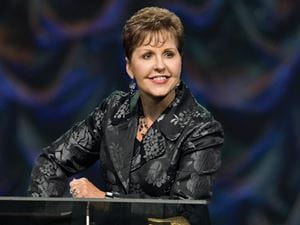
What do you want people to gain from “Power Thoughts” compared to your book “Battlefield of the Mind” that deals with thought patterns as well?
I think “Power Thoughts” takes you a little bit beyond the “Battlefield of the Mind.” “Battlefield of the Mind” talks a lot about right and wrong thinking, and mainly gets the point across to people that they actually can control their thinking. [In] “Power Thoughts” I kind of laid down that foundation in the first part of the book. But in the second part of the book, I go into 12 specific areas showing that if you really, you know, want to develop a habit in breaking wrong thinking in your life--you need to focus in that area of your thinking for a period of time until your mind is renewed. It also talks a lot about confessing scripture in the area you have a weakness over, where you want to build strength. So I really talk a lot more about confession in this book then I did in the “Battlefield of the Mind.”
What practical ways can new believers overcome years of negative thoughts?
For me, [it’s] understanding that negativity was displeasing to God, or even that it’s sin. So I think that before you can overcome anything, believe that you can. Just learn to take a little time before you start reacting, and just think now: “Is being negative going to do me any good here?” Nobody can ever say that being negative ever helped them at all--not in any way. So I think we need to get smart enough to do what’s going to help us and [not] just continue to do things that are going to hurt us. It’s pretty easy to read something or hear about it in a message, but it’s that personal application of that where it’s just you, God, and your problems, that are going to give you the power to get stronger and stronger.
How have you overcome this battle?
My father was negative person. He actually taught me to be negative, if that makes any sense. I remember him saying: ‘You know there’s no point in expecting anything good to happen because it won’t.’ I grew up in such a negative atmosphere. It was very difficult for me to make that turn. I had to really stand my ground and fight that battle for a good number of years. You know, sometimes if you got a problem deep rooted in your life, it takes a little bit of time to overcome it in that area.
You wrote that communication (Rule No. 4) with God, our “control tower,” is imperative to overcoming destructive thoughts. Why are people so afraid of approaching Him?
I think first of all that people need to understand that Jesus didn’t die for us so we all can have a religion and go to a building on Sunday and call it church. Jesus died so we can have an intimate relationship with God through him. Here’s the foundation for all victory in our lives. Jesus said very plainly in John 15 (verse 5) “…apart from Me you can do nothing.” We don’t just have victory because we try to have victory.
What advice would you give someone in trying to open up with God?
I always had a wrong fear of God. I always thought I had to be so careful to make Him mad. One day He put it on my heart saying: ‘I’m not as hard to get along with as you think I am.’ People need to really step out in faith and talk to God. We don’t need to talk to God about things that are just over our heads--actually everything is kind of over our heads. I talk to Him about everything like getting my hair done to working out at the gym to everything that I do. That’s what it means to be intimate [with God].
Rule No. 1 and No. 3 in your book challenges readers to stay calm in the storm and to maintain a right attitude under pressure. What scripture do you recommend when faced with such thoughts?
The Word of God is active, energizing, sharp and powerful like a two-edged sword. So I think when you approach the Word of God it’s not just a book—it’s more than ink on pages. His Word became flesh and dwelt among us. If I have a particular situation that comes up and causes me worry, to this day I will open up my Bible to certain scriptures that I am familiar with about worry. I will read, read it out loud, and trust the power of what’s in that word. I will go to Proverbs 3. [Proverbs 3:5,6]
"Trust in the LORD with all your heart and lean not on your own understanding; in all your ways acknowledge him, and he’ll direct your path." I am real fond of Philippians 4:6-7: “Do not be anxious about anything, but in every situation, by prayer and petition, with thanksgiving, present your requests to God. And the peace of God, which transcends all understanding, will guard your hearts and your minds in Christ Jesus. I really have to do what I tell everybody to do. The Word of God is like medicine for the soul. I don’t recommend when you have a problem to read from the Bible randomly. I think you need to go to the areas that will minster to your specific need believing that word is going to be like medicine. It’s like when somebody hurts my feelings and I’m having a difficult time forgiving. Even though I’ve written a lot of books on forgiveness and I [may] set my mind that I’m not going to live in unforgiveness, but that doesn’t mean that my emotions don’t flair up.
You talk about staying right with God in your book. How important is it to stay right with Him?
One thing that comes to my mind is what the apostle Paul said that “I strive always to keep my conscience clear before God and man [Acts 24:16].” So Paul was basically saying one of the most important things to him was keeping his conscience clean and not trying to function in a relationship with God where he was feeling guilty most of the time about things he was doing, and [the] choices he was making. We have a conscience. Our conscience can either be our best friend or our worst enemy. If people would stop doing things that they don’t have peace about or doing things that their conscience is telling them it’s not right, that in itself would give them a more peaceful and right relationship with God.
How has revamping your thinking changed your life and helped you stay the course with the pressure of having a world-wide ministry?
I spend the first couple of hours a day in the word, praying. You know when I say “praying” I don’t want to give the impression that I’m on my knees for the first two hours everyday. But I communicate with God, talk with Him. I read. I might even write something in my journal. Just like a person that gets hungry and eats breakfast until they’re full--I can tell for me when I’m full spiritually. Then I’m kind of released to go on with my day. We need to come to Him for what He is, not what only He can do for us. Eventually we need to learn that He’s our life. I think some people in ministry make a big mistake that everything they do is to give out, give out. If you’re empty you have nothing to give. I have to make sure that I stay right with God. I tell people all the time [that] I spend a lot of time to keep myself right with God because I have nothing to give to them if I’m a mess.
Click here to purchase "Power Thoughts: 12 Strategies to Win the Battle of the Mind"


